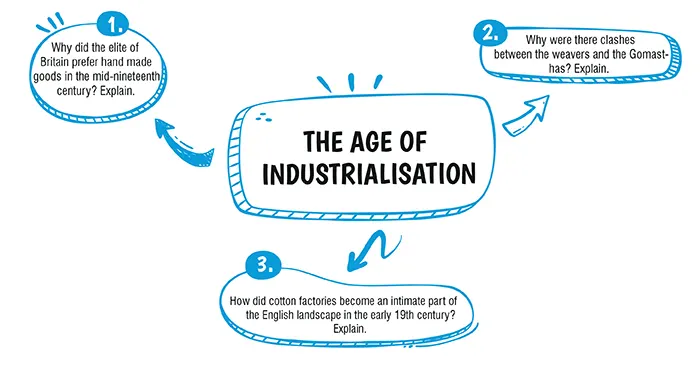

Provided below are pivotal inquiries concerning Class 10 History, specifically concentrating on Chapter 4, "The Age of Industrialisation." These questions have been thoughtfully curated to serve as a valuable tool for students seeking to excel in the CBSE Class 10 Social Science Examination during the academic year 2023-24. The encompassing assortment of question styles incorporated in this compilation is purposefully tailored not only to foster lucidity in comprehension but also to facilitate strategic exam readiness, reinforce adeptness in addressing challenges, and cultivate self-assuredness among students.
In Europe, The age of industrialization marked the start of modernization, accompanied by the establishment of factories and extensive production, leading to global trade. Technological innovations accelerated this transformation. European colonies were also modernised. This chapter will discuss the history of Britain, the pioneering industrial nation, and India, where industrial change was shaped by colonial rule.

Ans. (d)
Explanation:
Industries began to develop in England during the second half of the eighteenth century, and by the nineteenth century.
Ans. (d)
Explanation:
The spinning jenny is a multi-spindle spinning frame, and was one of the key developments in the industrialisation of textile manufacturing during the early Industrial Revolution. It was invented in 1764 or 1765 by James Hargreaves.
Explanation:
The upper class in Victorian Britain preferred things produced by hand because they came to symbolise refinement and class. a. The products could be customised according to their choices and they could get these made according to their wishes and likes.
Explanation:
They were greedy and the weavers were blamed for mistakes in delivering supplies. Because of this reason there was a fight between both the Gomasthas and the Weavers.
Explanation:
Cotton factories became an intimate part of the English landscape in the early 19th century. In the 19th century, a series of inventions took place and it increased the efficiency of production at every step of the production process, especially in the field of cotton textiles.


If you are looking to further practice and enhance your understanding of the concepts discussed in the chapter, oswal.io provides a comprehensive set of questions for understanding the concept in a better way
Ans: Industrialization is the process of transforming an economy from primarily agricultural to one based on the manufacturing of goods.
Ans: The benefits of industrialization include increased job opportunities, inspiring innovation, higher production levels, raising the standard of living, and alleviating poverty.
Ans: Chapter 4 of Class 10 History explores industrialization and its role in initiating modernization. It discusses how the establishment of factories facilitated large-scale production, leading to global trade. The chapter also addresses questions about Britain's status as the first industrial nation and how colonial rule influenced the pattern of industrial change in India.
Ans: In Chapter 4 of Class 10 History, students will learn about the following important topics: Before the Industrial Revolution,Hand Labour and Steam Power,Industrialization in the Colonies,Factories Come Up,The Peculiarities of Industrial Growth and Market for Goods.
Ans: The following are the steps taken by the government to protect the species from being extinct.